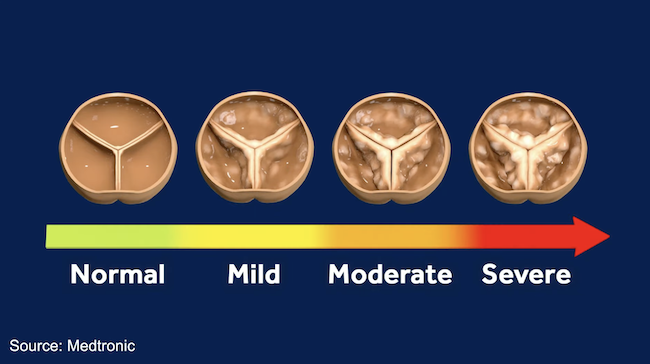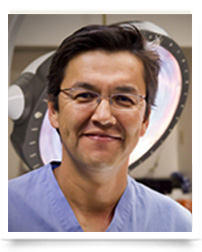Moderate Aortic Stenosis: Why Wait for Surgery?
Written By: Allison DeMajistre, BSN, RN, CCRN
Medical Expert: Craig Baker, MD, Chief of Cardiac Surgery, Keck School of Medicine of USC, Los Angeles, California
Reviewed By: Adam Pick, Patient Advocate, Author & Website Founder
Published: August 14, 2025
Patients who learn the best course of action for their mild-to-moderate aortic stenosis is to “watch and wait” are typically not relieved by this news.
On one hand, it’s a comfort to know that surgery can be delayed until the stenosis is classified as severe. Still, it can be stressful knowing that the only option is to wait until the valve gets much worse before having a surgical replacement. Despite their worry and stress, patients can rest assured that their cardiologist or surgeon will continue to monitor their valve with regular check-ups and echocardiograms to make sure the stenosis is not progressing. However, as time goes by and patients start experiencing fatigue or shortness of breath, they can’t help but wonder why the standard of care is simply to wait until things get worse.
We receive many questions from anxious patients who feel stuck in the uncertainty of the watchful waiting stage. The latest question comes from Catherine, who asked, “I’m 73 and I have moderate aortic stenosis. I was told that I can get a replacement only when the stenosis is severe. I have been tired for months. Both my parents died from heart disease. Why do I have to wait?” To answer Catherine’s question, we met with Dr. Craig Baker, the Chief of Cardiac Surgery at the Keck School of Medicine of USC in Los Angeles, California.
Watchful Waiting & Aortic Stenosis Progression
Here are the key insights shared by Dr. Baker:
- The guidelines for treatment. “That’s a great question, Catherine,” said Dr. Baker. “It is true that when we look at guidelines to treat valvular disease, it generally focuses on people with severe disease, and people with severe disease are often symptomatic.” However, Dr. Baker explained that some asymptomatic patients may still meet criteria for surgery depending on their ventricular function and response to exercise.
- Symptoms need to be assessed to determine if they are related to the valve disease. “The first thing I think about for Catherine is that it is unusual but not impossible to have symptoms with moderate disease. So, the first question is whether the symptoms are attributed to the valve, and has Catherine undergone the proper testing? Because some people who appear to have moderate disease may end up having more severe disease if they exercise test and measure gradients on an angiogram,” said Dr. Baker. “I would recommend that Catherine talk to her cardiologist. Make sure she’s had a comprehensive workup that shows whether her stenosis is moderate or severe, and then make sure her symptoms are attributable to the valve. There may be coronary disease or another cause for the symptoms.”

Thanks Dr. Baker and Keck School of Medicine of USC!
On behalf of all the patients in our community, thank you, Dr. Craig Baker, for everything you and your team are doing at the Keck School of Medicine at USC in Los Angeles, California!
Related Links:
- Ask Dr. Baker: Mechanical Valves, Biological Valves and the Ross Procedure
- Baker’s Patient Success Stories: Dudley and Helen
Keep on tickin!
Adam
P.S. For the deaf and hard-of-hearing members of our patient community, we have provided a written transcript of our interview with Dr. Baker below.
Video Transcript:
Adam Pick: Hi, everybody. It’s Adam with HeartValveSurgery.com and we are in Los Angeles, California at the Society of Thoracic Surgeons Conference. I am thrilled to be joined by Dr. Craig Baker, who is the Chief of Cardiac Surgery at the Keck School of Medicine at USC in Los Angeles, California.
Adam Pick: Dr. Baker, you and I have known each other for a very long time. It is great to see you here. Great to see you, Adam. Yeah, so at STS there’s lots of data coming out, research, you’re giving talks, and at the same time we’re getting questions from patients all over the world about heart valve disease.
This one comes in from Catherine and she asks, “Hi Adam, I’m 73 and I have moderate aortic stenosis. I was told that I can get a replacement only when the stenosis is severe. I have been tired for months. Both my parents died from heart disease. Why do I have to wait?”
Dr. Craig Baker: That’s a great question, Catherine. It is true that when we look at guidelines to treat valvular disease, it generally focuses on people with severe disease. And people with severe disease oftentimes are symptomatic, but then even patients that are asymptomatic, there’s criteria such as your ventricular function, response to exercise that we will operate on.
I think the first thing I think about, Catherine, is it’s unusual, not impossible, to truly have symptoms with moderate disease. So the first question is, are your symptoms absolutely attributed to that valve? And have you actually undergone the proper testing? Because some people that appear to have moderate disease may end up having more severe disease if they exercise test, if they measure gradients on an angiogram.
I would recommend that you talk to your cardiologist. Make sure you’ve had really a comprehensive workup that shows if you’re really moderate or severe. And then look in to make sure that your symptoms are clearly attributable to the valve. Maybe there’s coronary disease or another cause for the symptoms you have.
Adam Pick: Wow, super helpful. Catherine, I hope that is going to give you some comfort and direction in terms of your next steps. And Dr. Baker, on behalf of Catherine, on behalf of patients at HeartValveSurgery.com, and patients all over the world, thanks for everything you and your team are doing in Los Angeles, California at USC. Thanks for being with me today.
Dr. Craig Baker: Thank you, Adam.






